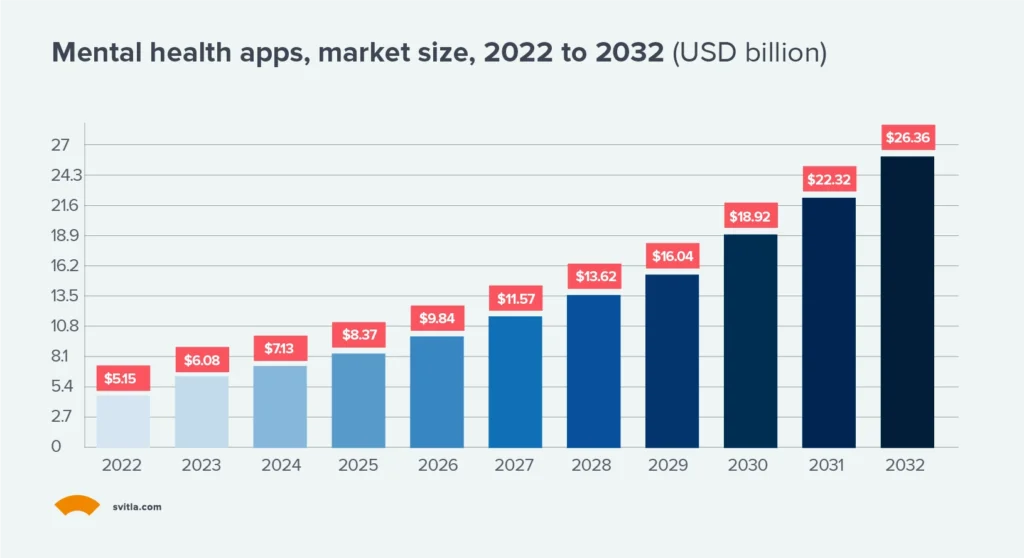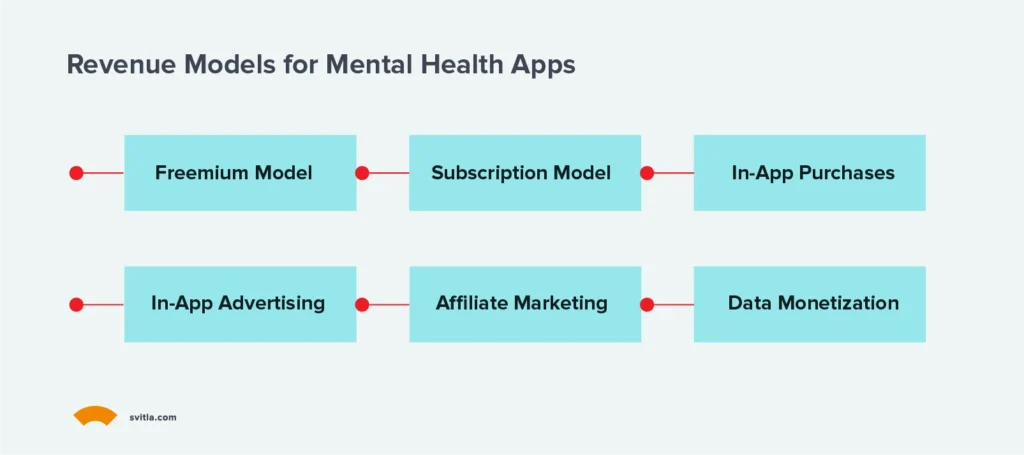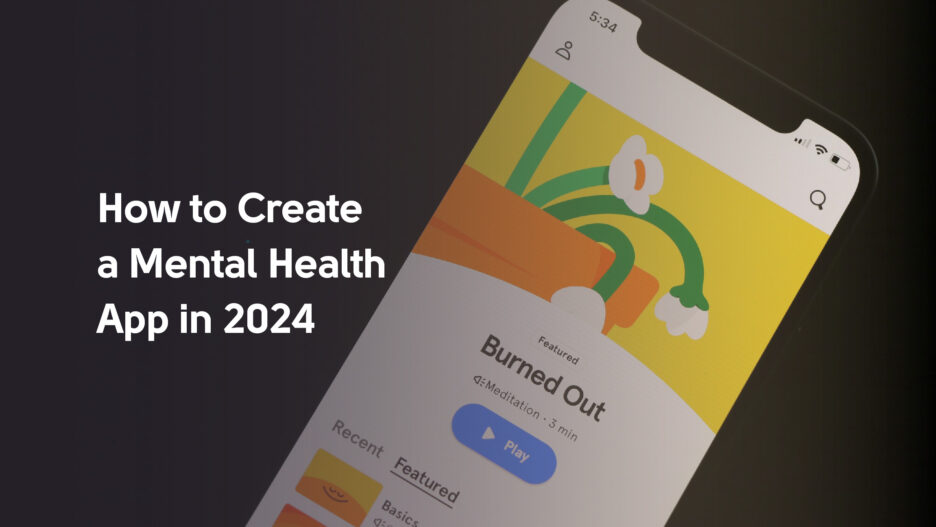In the tough times of the pandemic and lockdowns, mental health apps have become more critical than ever. People are turning to them to navigate the challenges of self-isolation, highlighting how crucial mental health app development has become.
This field has carved out a significant place in the mobile app market, driven by a growing demand. Recent research tells us that 1 in 5 Americans aged 18 and older are dealing with diagnosable mental disorders. Moreover, 1 in 20 US adults is diagnosed with severe mental illness. No wonder the mental health market size is growing tremendously and is expected to reach $26.36B by the end of 2032.

Consider our go-to article if you're considering jumping into this space with a fresh idea. This guide explores top market players, key features, possible challenges, and monetization models of healthcare apps. Let’s dive in!
What are the Mental Health Apps?
A mental health app is a personal toolkit for checking a user’s well-being. It covers everything from mood and sleep to stress and anxiety. Yet, it's not a substitute for the doctor, but it helps to connect users with healthcare providers, give a symptom check, and suggest their next steps.
Regarding how these apps look and work, there's no one-size-fits-all. The design and functionality depend on your aim and who you're making it for. So, if you're thinking of crafting a mental health app, there's no set template to follow.
Let’s see how users can benefit from a good mental health app:
- Convenience. Such apps allow starting a mental health journey easily. They only need a gadget and an Internet connection to download the app. There is no need to stay in one place – they can be anywhere without disrupting their progress.
- Affordability. Mental health apps are a cost-effective alternative to traditional therapy, sometimes free. This makes them accessible to more people.
- Self-exploration. Users can monitor sleep, mood, and meals. Some apps even provide valuable info and self-care tips, fostering ongoing self-discovery and collaboration with specialists.
- Accessibility. Mental health apps connect people globally and bring top-notch support to those who might've felt left out.
- 24/7 support. These apps are available round-the-clock, offering timely assistance, even in emergencies.
Top Mental Health Market Players
Now that we’ve discussed the essentials, let’s move on to the most prominent mental health applications to get inspired.
BetterHelp
Founded back in 2013, BetterHelp has become a go-to spot for online mental health care. You can chat with licensed therapists through video, audio, or messaging, and you don't even have to leave your comfy spot – it works on your phone, tablet, or computer.
BetterHelp ensures their therapists are legit, with degrees and at least three years of real-world experience. From everyday stress to the heavy stuff like anxiety and trauma, they've got specialists for everything. Plus, they're all about inclusivity, with some therapists focusing on supporting the LGBTQ+ community.
To start, you only need to answer a few questions about what you're dealing with, and they offer you a therapist who fits you. Then, you can schedule your weekly sessions right there in the app.
Price: $60-$90/week, billed every 4 weeks
Platforms: iOS, Android
Free trial: No
Calm
Calm is the second health and meditation app worldwide by downloads, according to Statista. This is one of the most popular programs for people who are struggling with insomnia or poor-quality sleep. If you're on a budget, the free version gives you some basics – timed meditations, sleep scenes, bedtime stories, and breathing exercises.
A Calm Premium Subscription gives plenty of resources for better sleep and unique features like bedtime stories read by celebs like Matthew McConaughey and P!nk, chill tunes from Disney, and these dreamy soundscapes that transport you to another dimension for some A+ snoozing. Plus, they've got these visually stunning sleep scenes that set the vibe as you doze off.
Calm isn’t just about nighttime – they've got yoga, stretching, and dance classes to help users keep grounded and a truckload of themed meditations to boost that mindfulness game.
Price: Free to download; Calm Premium available for $14.99/month, $69.99/year, or $399.99 for lifetime membership; Calm Premium Family Plan available for $99.99/year for up to 6 accounts; Calm for Students available for $8.99/year after a 3-month free trial through Amazon Prime
Platforms: iOS, Android
Free trial: Yes
Yours
Yours is a meditation and mindfulness app with a beautiful interface for Instagram and TikTok users. What sets Yours apart is its AI magic – it serves up sleep soundscapes, meditations, and breath work, all customized to whatever users are dealing with. The audio is led by psychologists, engineers, and certified meditation gurus. Users can choose from many soundscapes and ASMR recordings, perfect for those study sessions, work hustle, or just trying to relax. Sleep stories range from fairy tales to stories just for soon-to-be parents. There are hundreds of classes from certified instructors for yoga lovers for a wide range of users, from total newbies to seasoned pros.
Price: $6.99/month, $59.99/year
Platforms: iOS, Android
Free trial: Yes
Headspace
Headspace has been rocking the mindfulness app market since 2010. This app is about helping users live in the present, even if they’re total newbies to meditation. They've got a massive library of guided meditations, ranging from quick 3-minute "mental resets" to daily themed sessions that fit right into your busy schedule. For those just dipping their toes into meditation, Headpsace offers videos and mini-courses to a mindfulness journey.
One of the distinctive features is that SOS sessions are designed to calm users down in challenging moments like grief, anger, or stress. For those work-from-home days, they throw in breathing, cardio, and movement exercises led by fitness whizzes. Besides, the app offers “sleepcasts” – ambient sounds with soothing stories that many users swear by.
Price: Free to download; $12.99/month or $69.99/year for a premium subscription; $99.99/year for a family plan with up to 6 accounts; $9.99/month for verified students
Platforms: iOS, Android
Free trial: Yes
Happify
Happify is the least, but not the last, on our list. This app is about mixing positive psychology and mindfulness to amp up your happy feelings, increase productivity, and make life more awesome.
The app helps users identify the areas to level up, whether boosting their self-confidence, kicking negative thoughts to the curb, or achieving better career results.
They've got 65+ "tracks" to choose from, so users can pick the one that fits their goals. The Happify Plus subscription unlocks even more tracks, games, and activities, plus the nifty 20-page character report to uncover even more growth potential.
Price: Free version available; Happify Plus subscription available for $14.99/month, $139.99/year, or $449.99 for a lifetime membership
Platforms: iOS, Android
Free trial: No
Must-Have Features of Mental Help Apps
In modern mental health apps, you can integrate features like cognitive behavioral therapies, acceptance and commitment therapies, mood training programs, gamification, or forums. With such a variety, you should find a balance to satisfy your target audience's needs. To make things easier for you, we’ve highlighted two groups of features: basic functionality required for an MVP and advanced features you can implement further.
Basic Features for Users
- Sign-up. Users require an opportunity to create accounts easily using social media or personal credentials.
- Profile setup. Simple personal account creation with options to customize preferences and track progress.
- Goal setting. Create a clear dashboard that displays progress through charts, motivating users.
- Notifications. Push notifications remind users to be on track with exercise or meditation sessions and appointments with mental health specialists.
- Data protection. Ensure compliance with local regulations like HIPAA to keep your users’ data secure.
Basic Features for Physicians
- Dashboard. Web app dashboards help physicians manage patient data efficiently, track progress, etc.
- Chats. Real-time chat or chatbot support for doctors to provide advice and consultations.
- Calls. Users can connect with experts via phone or video conferencing for personal consultations or check-ins.
- Schedule. Scheduling aids doctors in providing quality care.
Advanced Features
Besides the must-have features, your future mental health application can include some opportunities:
- Calendar and checklist. These serve as users’ sidekicks, helping them to control their daily grind.
- Sleep tracking. To make this feature work, you need an integration with wearables like fitness bracelets. This feature is convenient for those dealing with anxiety or major depression.
- Trigger checker. Users can jot down what's sparking the negative thoughts so they can discuss it with their therapists later.
- Pill reminder. The app can send users notifications to pop those pills right on schedule.
- Urgent help. When life throws a curveball, users may need additional support. Add an “Urgent help” button so users can click it for a quick chat with their mental health team or friends and family.
Revenue Models For Mental Health Apps
Every app owner wants to know how to make money from their app. Yet, the monetization models are generally the same as other apps. Let’s shed some light on this.

Freemium Model
The term "freemium" comes from a combination of the words "free" and "premium”. This revenue model supposes that users have free access to a basic version of the application. Yet, they should pay to get access to more advanced features like an extensive meditation library or exclusive yoga techniques. You can also offer users a free trial period of a premium version. It is a thoughtful way to showcase your app's full functionalities.
Subscription Model
The idea is that users would pay a regular fee to get the app’s content and features. Usually, entrepreneurs go for monthly or yearly subscriptions. Yet, some provide a 7-day free subscription to make users interested in their product and push to an ongoing subscription.
In-App Purchases
While challenging to set up, this model is great for making money in healthcare. Your app should act like a marketplace. So, users have access to things they need. Think about booking and paying for doctor visits, purchasing meds or supplements, or even signing up for fitness classes – all within the app. This way, you make money by taking a commission each time someone purchases.
In-App Advertising
Another way to make money is through advertisements. But here's the trick: think about who uses your app and what it's for. It's better to skip annoying ads about mental disorders. However, you can add ads for self-improvement apps if they're positive and calming.
Affiliate Marketing
You can also collaborate with other companies to sell their products or services via your application. Here's how you make money: you get a commission for every sale made through the unique links you share. A prominent example is the Fitness Blender app. It promotes workout equipment and supplements using links within the app.
Data Monetization
One more way to make money is to sell the data your app gathers. Yet, there is a catch: you can't sell anything that could identify specific users according to US and European laws. But you can still sell general data, like trends and insights. For instance, if your app tracks how users use a particular medication, you can sell that info to interested parties.
Top Concerns Mental Health Apps Need to Address
Mental health app development is a big deal. That’s why you can see lots of challenges on your way. Let’s explore some of the most common ones so you can prepare to address them.
Regulatory Compliance
Ensuring the security and privacy of your mental health app is a big deal. One of the reasons people lean towards mobile mental health apps is because they trust them to keep their info safe. To keep your users' info safe, mental health app developers must follow specific regulations:
- The Health Insurance Portability and Accountability Act (HIPAA) in the USA;
- The Personal Information Protection and Electronic Documents Act (PIPEDA) in Canada.
- The General Data Protection Regulation (GDPR) in the EU.
- GDPR, Data Protection Act 2018, and UK Privacy and Electronic Communications Regulations 2003.
And the list goes on, depending on where your business sets up.
Privacy & Security
Continuing the topic of security, you should take extra measures to protect users' personal information. To achieve this, you must implement measures like two-factor authentication, end-to-end encryption, and 128/256-bit encryption of database keys, so the consumer data stays safe from leaks and theft.
Building Trust
Trust is critical for mental wellness apps to succeed. Users want to know their data is safe and that the app has their best interests in mind. To make this happen, you must use strong security measures, get the proper data privacy certifications, and be upfront about how data is handled.
Clinical Evidence
Working with mental health experts must ensure your mental wellness app is on point. Bringing in tried-and-true therapeutic methods adds credibility and makes the app more impactful. You should back up your app's features with references or citations to strengthen clinical validity.
Overcoming Stigma
A big hurdle for mental health apps is tackling the stigma around reaching out for help. Many people hold back from using these apps because they worry about being judged or facing social consequences. Hence, you have to make a safe and judgment-free space for users.
How to Develop a Mental Health App?
Now that we are done with theory, let’s find step-by-step instructions on developing your product. We recommend you start with an MVP. The simplified version with basic functionality will help you understand the market demand for your app and update it according to the customers’ needs.
- Step #1. Define your target audience. To make your mental health app successful, focus on keeping users interested and using the app regularly. Understand your audience by studying their preferences, backgrounds, and needs. Consider factors like culture, user types (scientific or gamified), age groups (kids, teens, students), and whether your app is free or paid. This knowledge will help tailor your app to meet users' needs and ensure long-term engagement.
- Step #2. Conduct market research. Check out other mental health apps – see what works and what doesn't. Read user reviews to know what people love and what's missing. This research informs the development process and enables the delivery of a superior app with enhanced features to meet user needs.
- Step #3. Define core features. List the must-have features for a mental health app, drawing inspiration from popular apps. As a new player, enhance these basics with unique additions to boost your app's appeal and popularity. This involves covering the essentials and introducing distinctive features that make your app stand out and resonate with users.
- Step #4. Develop an app. Ensure your app is coded to meet safety and user-friendly standards, a crucial step requiring significant development time. Follow Agile principles and conduct interim tests with each iteration. Additionally, you must comply with HIPAA regulations to protect patient information, incorporate third-party medical audio/video calling SDKs for telemedicine therapy, use engaging off-the-shelf components, set up DevOps to streamline development, and reduce technology barriers by investing in ready-to-use libraries for authentication, scheduling, and chatting features.
- Step #5. Conduct legal and security checks. Ensure you follow all the laws and regulations of the country where the application will be used. As mentioned, the main ones are the Health Insurance Portability and Accountability Act (HIPAA) in the US and GDPR in the EU.
- Step #6. Test it. Once the app is developed, you must ensure it works correctly. Conduct user testing with a sample group to gather feedback and identify areas for improvement. The app may undergo iterations involving design, functionality, or content adjustments based on test results. You must engage mental health professionals throughout this process to maintain the app's effectiveness and evidence-based approach.
To Conclude
In our fast-paced world, mental health apps act like a virtual friend, ready to lend a helping hand whenever users require support. With just a tap, these apps guide us, keep an eye on our daily routines, and offer therapeutic assistance.
As more and more people worldwide grapple with mental health issues, creating and improving these apps becomes crucial. It's all about ensuring help is always within reach, chipping away at the stigma surrounding mental health, and building a world where everyone can prioritize and access the support they need for their well-being.
Are you about to develop a mental health app? Svitla Systems has got your back. With our extensive experience in healthcare software, we can build an app that gets the job done and follows all the necessary regulations. Ready to kick things off? Reach out to our team, and let's make it happen.





